


This summary for Playoff Game Two was written by Eauxps I. Fourgott. Many thanks for volunteering to put this report together! 
Much like the Wildcard game three weeks prior, this season's second playoff game featured a group of leaders consisting entirely of low peaceweight warmongers. De Gaulle was this field's pacifist with a 5.7 aggression rating, and everybody on the map had a default peaceweight of 2 or lower. Unlike in the Wildcard game, though, half of this field (De Gaulle, Mehmed, and Hannibal) refused to declare war at Pleased relations, setting up the possibility of them becoming passive on this map as they made friends with everybody thanks to shared peaceweight. On the other hand, the remaining three (Louis XIV, Kublai Khan, and Tokugawa) were willing to attack all but their closest allies (and Toku even his closest allies, if the Wildcard Game was any indication), and Louis and Kublai had both central starting positions for easy access to everybody and free Creative culture for easy border tension, so it was unlikely that the entire game would grind to a halt anytime soon. In the picking contest, this game was perceived as being largely open and up to the die rolls of where war was declared and how the game's religions would be spread, although Kublai, the only seeded leader in the game, was the favorite for victory with about half of the vote.

One major wildcard for this game was the early religions; none of the leaders here started with Mysticism or had a strong religious focus, so they were completely up for grabs. Kublai ended up going for one right out of the gate, founding Buddhism, but it was some 20 turns until anybody made an attempt at the second one. This proved helpful as eventually several different leaders made an attempt for it, thus getting Mysticism; Louis would eventually win the race and found Christianity, but De Gaulle and Mehmed had both unlocked monuments in their quest for a faith, preventing them from completely ignoring early culture as Hannibal and Tokugawa would now go on to do. A highly significant settling race was also unfolding in the early turns, as Kublai and De Gaulle were both expanding directly at each other, racing for a juicy region between them that was filled with floodplains and three gold resources. They planted their third cities three tiles apart in this region, stoking the flames of future conflict and further tensions were built as De Gaulle later founded and converted to Islam. A significant contingent of the community had picked De Gaulle to win this game because of his floodplain-filled starting area, and now it looked like he might have an early fight with Kublai to decide who would actually rule this game.
More settling drama with Kublai later unfolded in the east, as he raced Hannibal to a spot on the southeastern coast that featured the only source of horses anywhere near Mongolia. Hannibal had begun this race with the head start, but had also sensibly sent an archer escort with his settler - safe, but slow. Kublai recklessly sent his settler alone instead, and with no barbs in the area, he was able to get away with it, using its faster movement speed to snipe the spot from Hannibal and ensure he'd have access to his Keshiks. As the landgrab phase went on, the six leaders all expanded at a roughly even rate. Nobody was getting completely locked out or embarrassed here, and even more cramped leaders like Tokugawa and Hannibal were getting their fair share of land. That didn't mean everybody was equally strong, though - Toku and Hannibal were stunted as they still lacked any culture in their cities, while Mehmed's land was largely covered in jungle, slowing down his early development. The three leaders who'd founded religions were in the best shape: Kublai had claimed a good share of land (although he currently also had a weak economy), De Gaulle had a very strong research rate thanks to all his floodplains cottages, and Mehmed and Toku's weak situations made Louis the king of the north. While most were running out of room to expand, he also had significant tundra backlines where he could found some extra fishing villages.
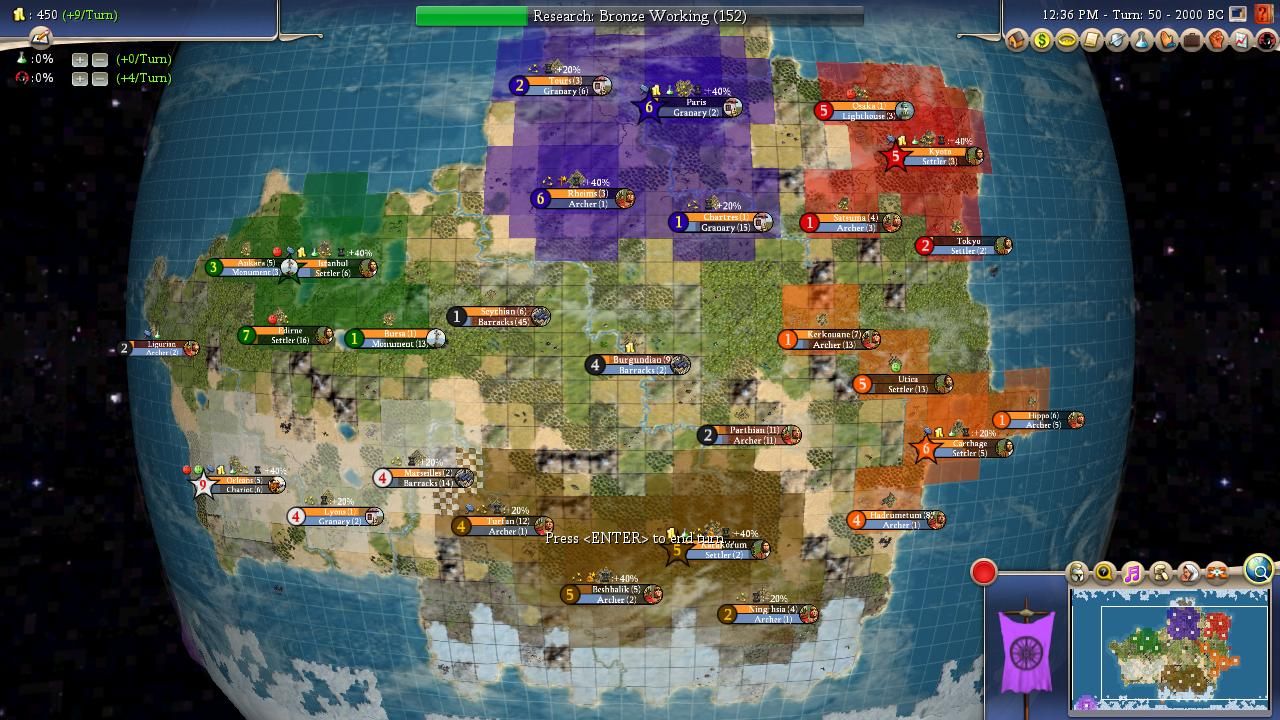
This status quo largely held as this phase reached its close. Kublai had fallen a bit behind the two French leaders, but was still in third place with a good-sized empire. De Gaulle and Louis were now jockeying for the lead; De Gaulle's land was higher quality, giving him the best economy, but Louis had more land, and had successfully converted his two northern neighbors to Christianity to ward off aggression - a development that would prove critical to how this game unfolded. Of the weaker leaders, Hannibal was at the top of the pack after taking two barb cities in the center of the map, and was even managing to run close to the leaders in research, while Tokugawa was lagging, stuck on a game-trailing six cities and with dicey prospects for any further expansion. Mehmed was somewhere in between.
Quite a few games this season have featured predictable first wars, and this one was no exception:
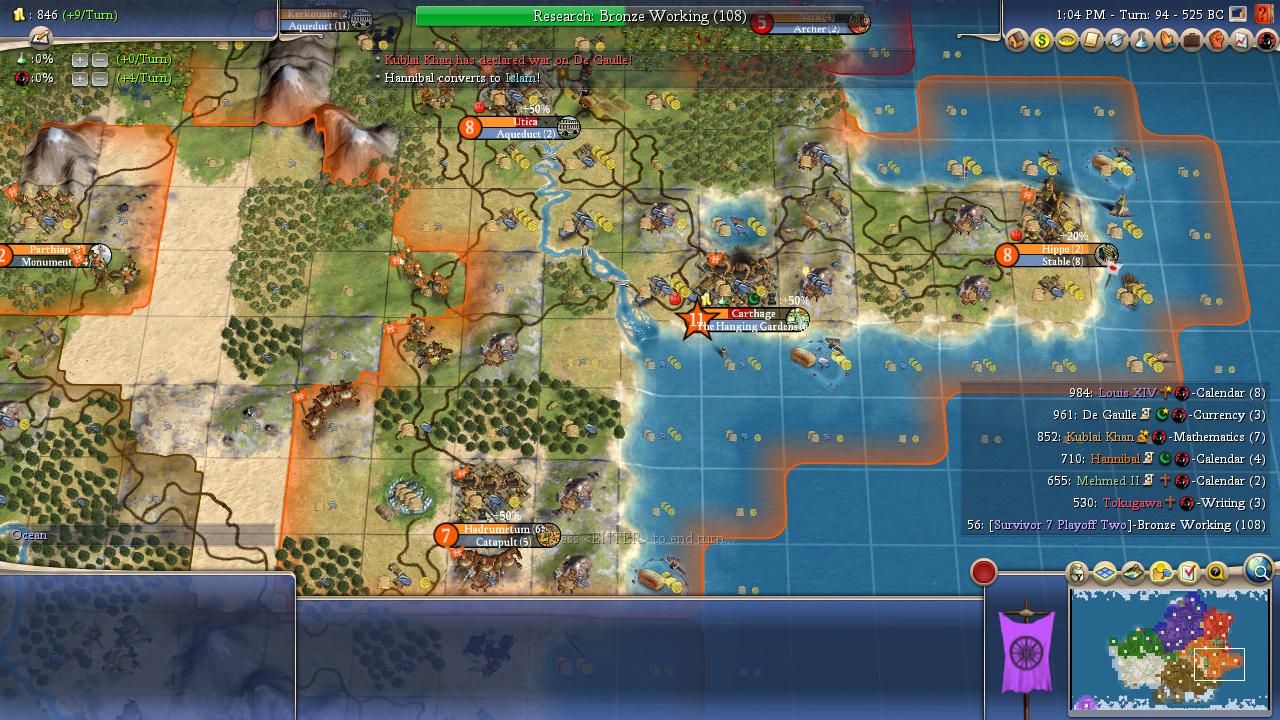
For the second game in a row, the conflict telegraphed from the game's opening turns did in fact end up being the first war to be declared. Kublai attacked De Gaulle, but it was immediately apparent that he couldn't make any headway on his own. We didn't even see what units he brought to the attack, because they were all killed in a counterattack on the first turn of the war! De Gaulle quickly responded to this attack by teching Feudalism to solidify his defenses and hunkered down for the long haul. But he soon received bad news that Ramesses never had to deal with: Mehmed joined the fray against him as well, putting him in a two-front war, and as those conflicts so often do, this quickly turned into a tactical disaster. De Gaulle had built up a large defense in the well-positioned border city of Marseilles, which could easily defeat any stack that came its way, but while it was busy holding off Mehmed's attack and a small probe from Kublai, the Khan sneakily marched most of his forces to the south, where they overpowered the much more lightly-defended city of Rouen. When De Gaulle moved his main attack stack down to retake the city, it opened the door for Mehmed to move in and capture the northern outpost of Dijon. The Western French were now stuck dealing with two very credible foes, and all the floodplains in the world couldn't save them if this kept up.
Over eastward, Louis was playing into his historical persona by declaring multiple capricious wars. First he attacked Hannibal, going after a pair of isolated cities on his southern border. This looked like a success at first, but once Hannibal organized his army and marched it up to the front, Louis started having a rough time of it, and ultimately acknowledged Carthage's ownership of these lands in a peace treaty. He next went after Kublai Khan, catching him badly out of position and easily taking the northern town of Old Sarai, only to soon sign peace without taking any more cities. That attack accomplished little other than messing with Kublai, who briefly found himself in a two-front war and thus couldn't press his own assault on De Gaulle. What the Sun King lacked in battlefield successes, though, he was making up for in cultural pursuits. He was making a run on the wonders, successfully building most of them and quickly assembling a potentially game-winning cultural machine, and combined with his naturally large empire and the lack of serious danger to fight off, this was helping him to build a significant lead in score. Meanwhile, Tokugawa was the last AI to get in on this game's warfare, attacking Hannibal soon after he'd fought off Louis. Once again, the attacker saw some early success on the battlefield, quickly taking a Carthaganian city, but Hannibal fought him off easily once he re-assembled his forces, and was once again clearly in no danger.
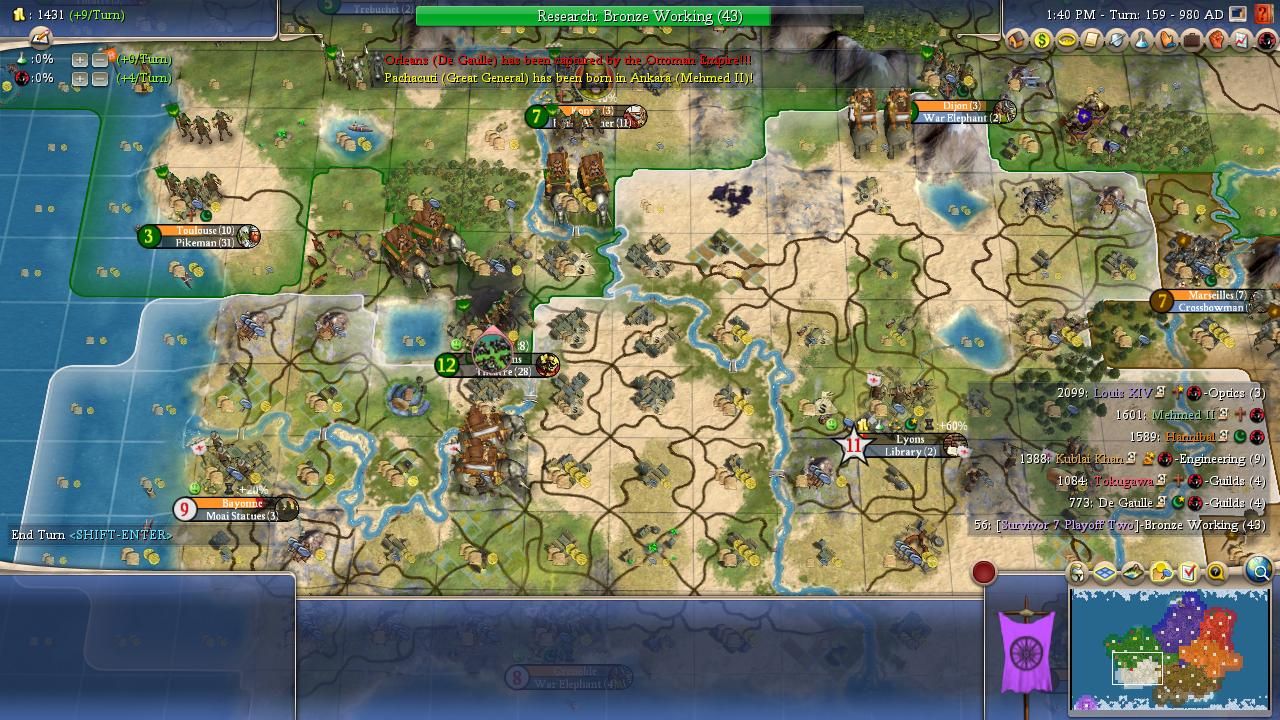
As for De Gaulle, the two-front war had been too much for him. By the time Louis backstabbed Kublai, he had already taken too much damage; the two armies had worn him down to the point where he was last in power, and so even working alone, Mehmed was now more than a match for him. As Kublai's attacks dried up, Mehmed was roving around, capturing all of the Western French outposts on the northern border, and soon enough he was advancing on De Gaulle's core. Kublai himself was exhausted after fending off Louis, and so accepted the outpost of Marseilles for peace, exiting the war with only two new cities in hand - hardly a smashing success. Mehmed was thus reaping all of the benefits and profiting greatly from his alliance with the Sun King, as the rest of De Gaulle's rich land was his for the taking. There was no more meaningful resistance to be mounted, and it was all routine work for Mehmed until he had taken the last city.
Thus De Gaulle was the first to die. He hadn't played a bad game at all here; his early settling was slow, but not in a way that ultimately cost him significant land, and he'd been in a strong position even after Kublai had attacked him, getting ready to take some Mongolian lands for himself with no major mistakes up to that point. He simply had the bad luck to be attacked by two strong neighbors in rapid succession, and it's a rare performance indeed that can overcome that kind of disadvantage. He fought stoutly but ultimately was powerless to prevent his fate. Perhaps founding his own religion was a critical mistake, setting himself up diplomatically to be dogpiled, but I don't think we can say for certain that we wouldn't have seen the same outcome even had he not. De Gaulle at least got the comfort of having his first playoff appearance in six years, but this outing was not as successful as his first.
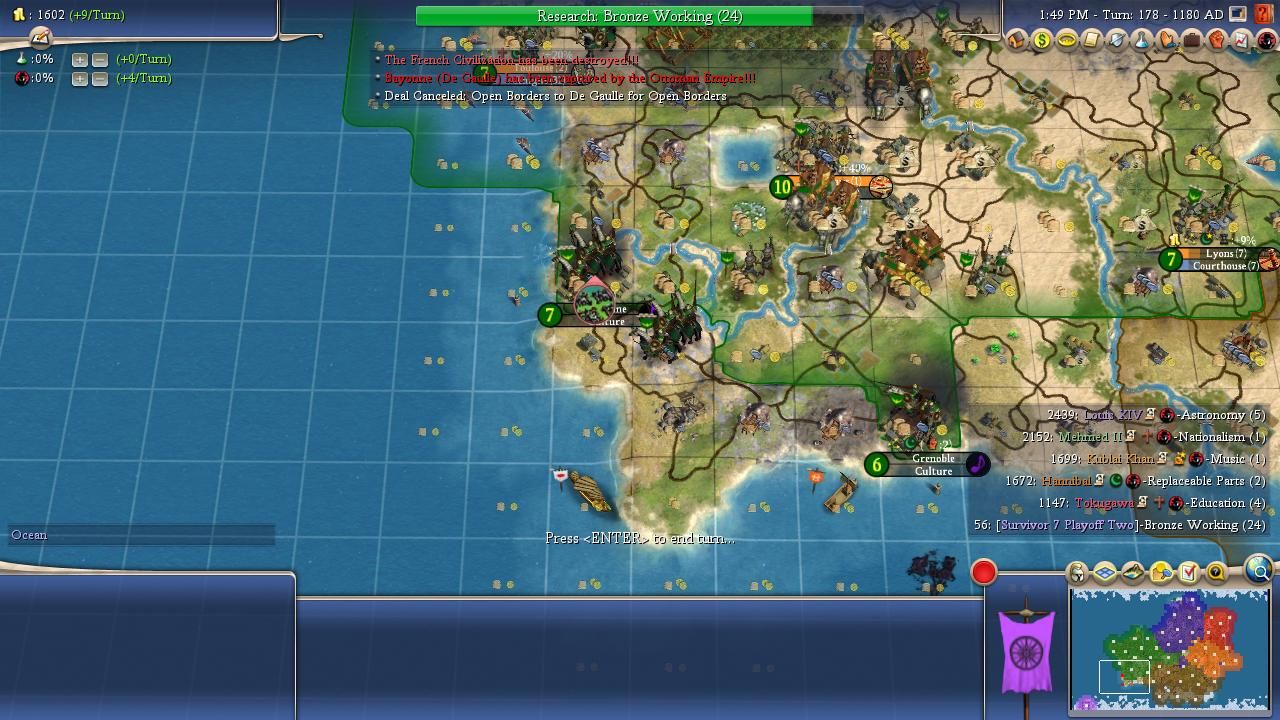
Mehmed ended this war in a strong position, first in power and having added some choice land to his already solid empire. He soon began making up the remaining ground between him and Louis on the scoreboard as his new acquisitions rebuilt and their full value was unlocked. De Gaulle's land did indeed propel his research rate up and make him the new top techer, and by this point a top two finish seemed virtually assured - he was the only AI so far to take significant ground, and nobody was going to be able to knock him down now. That said, a Domination victory was already out of the cards for him, as he liked everybody remaining and thus would be doing minimal fighting for the remainder of the game. Meanwhile, in the east, Hannibal had been working on an assault against the Japanese heartland - although facing stiff resistance from Toku's highly-promoted forces - but any hopes of bettering his position were dashed when Louis declared war on him for a second time. Hannibal did his best to turn the tables by making an early beeline for Rifling, but even with the more advanced soldiers, the flower of his army fell in Leptis, and Louis soon countered with his own Rifling research. Hannibal wasn't going to go down easily, and was able to fend the French off from making gains past his two border cities before making peace, but this attack had definitively finished him as a major power in this game. Mehmed and Louis were now head and shoulders above the other three leaders, and unless the two had a falling out and fought later in the game, nobody could do anything to topple them at this point.
No such falling out took place; Louis did drop to Pleased relations with Mehmed, but was content to sit back building at this point. Indeed, everybody was, as the game settled into a peaceful period. Relations were cordial between most of the leaders, Hannibal the only exception as he still got along poorly with Louis and Tokugawa, and as more turns passed with nothing happening to shake up the status quo, it started to look like we were in for a Louis/Mehmed championship ticket. Louis's cultural machine was really starting to spin up now, already promising to deliver him a victory by the early 300s even if he didn't turn on the slider, and Mehmed couldn't do anything to beat that pace, not when unwilling to attack his friend. Still less could any of the other three do anything to knock down the two leaders, so onward the game marched to its inevitable conclusion. After some 40 turns of world peace, though, things started heating up again. Ever the stubborn one, Tokugawa declared war on Hannibal once more, but this was rather clearly a mistake, as he was still attacking with muskets and curassiers against Hannibal's rifle-based force. It wasn't long before he acknowledged this, handing one of his six cities over in exchange for peace.
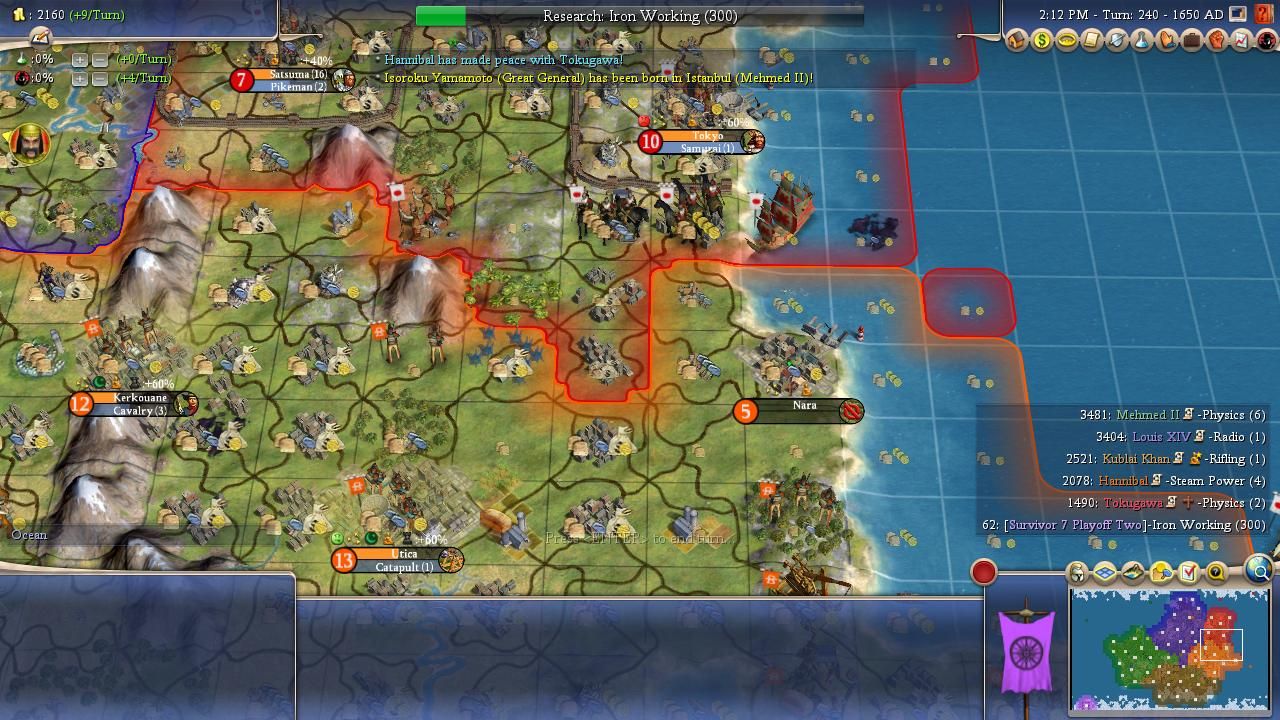
That wasn't the end of the action though, as Kublai made an attempt to… erm… I'm not sure what exactly he was trying to do, actually, but in practical terms what he did was declare war on Mehmed. While Toku's attack had simply been ill-advised, though, Kublai's was an utter disaster. Two turns into the war, Mehmed had already taken a Mongol city, and the next turn he met Kublai's attack stack in the field - and completely obliterated it. We were treated to one of the most dramatic dropoffs we've ever seen on the power graphs, as Kublai lost half or more of his military in a single turn. He too had attacked a rifle-equipped foe with only early gunpowder units, to say nothing of Mehmed's advantage in numbers and production, and he was soon paying dearly for this foolish move. Mehmed quickly started marching through the Mongol lands, and even as he knocked Kublai down to his last few cities, Hannibal returned to war against Tokugawa, having by now teched up to infantry to hold a decisive edge.
As for Louis? Why, Louis teched up to Mass Media, built the wonders from that part of the tech tree, and soon proceeded to flip on the slider, twiddling his thumbs and watching everybody else squabble while his cultural meters filled up at a breakneck pace. Less than twenty turns later, he won the game.
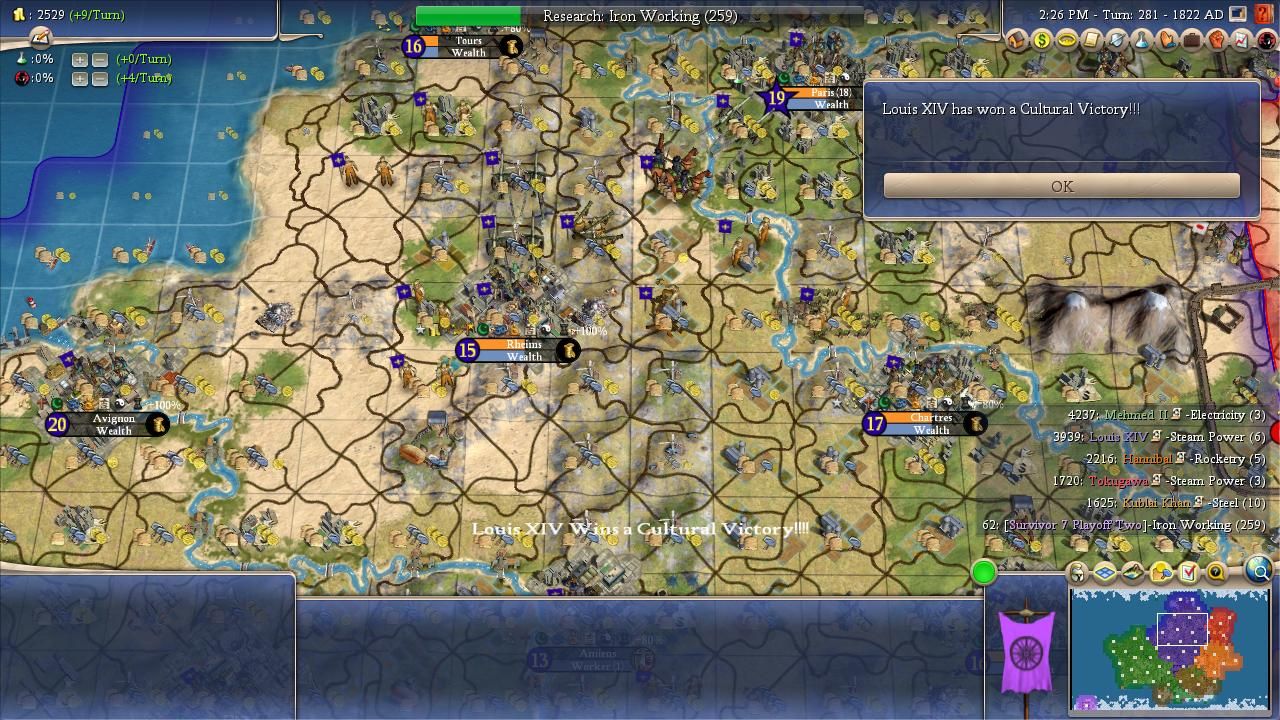
It was our second blazing-fast cultural victory in a row, and thanks to his tailor-made traits, unique building, and peaceful game, Louis was able to win even faster than Ramesses had last game - indeed, his Turn 281 victory is the fastest so far this season! As soon as both of his neighbors had converted to his religion, Louis enjoyed a privileged position on the map that was pretty much tailor-made for him to waltz to victory. He faced no threats and could pointlessly war at his leisure, while the militaristic bend of his rivals meant he had free reign on most of the cultural trophies; De Gaulle would have been his biggest rival there, but he was the only rival to be eliminated in this game! The only real threat to Louis would have been if somebody had gotten an unstoppable snowball running, but with friendly Mehmed the dominant conqueror on this map, that danger was safely avoided. This ended up being a virtually perfect setup for Louis where all he had to do after the early game was build wonders and avoid backstabbing Mehmed, and he was able to meet those minimal requirements to advance easily. Louis will thus be making his first appearance in the championship game; will he try to out-culture Ramesses, or take a more militaristic bent in his quest for the title?
As for Mehmed, he is also advancing with another second-place finish, although he did manage an impressive outing this time instead of simply getting lucky once more. To be sure, there was luck involved in his success here - he got the benefit of a friendly Louis on one border, and a golden opportunity to backstab a preoccupied rival on his other - but when he saw his opportunity he seized it, and his intervention was critical in dragging De Gaulle down. He similarly got lucky to see Kublai diverted by a backstab from Louis, but again capitalized by continuing to press his own assault until he'd conquered all of West France, from which point on he was the dominant AI in all respects except for culture. We did see in play here the curse of the warmonger who will not declare at Pleased, as this friendly field hampered Mehmed's ability to capitalize on his advantage and turn it into a winning position, but still, nobody was questioning that this performance was worthy of moving on, and it was doubly impressive when considering the rough starting terrain Mehmed had to contend with. Three years ago, we saw Mehmed take the title after reaching the Championship off a pair of second-place finishes. Could he do it again now and become the first two-time champion?
Finally, the remaining three leaders are now out of the tournament. Hannibal finished the game in third place, after an admirable effort that just couldn't get off the ground. He expanded much better than expected and was in a solid position at first, but then he kept getting hammered by attacks, and Louis's war declarations in particular prevented him from ever building significant momentum in this game. He still managed to be one of the best techers on the map, but while Louis was off in wonderland and Mehmed able to conquer some fertile territory, Hannibal was facing repeated invasions and thus didn't have the chance to keep up. Facing much stiffer fighters than his opening round opponents no doubt also contributed to his failure here; certainly one would think he'd have had an easier time of it had he bordered Lincoln again instead of Tokugawa! At least Hannibal got his dominant opening round performance this season, and thereby succeeded at repairing his reputation after his disastrous showing in Season 6.
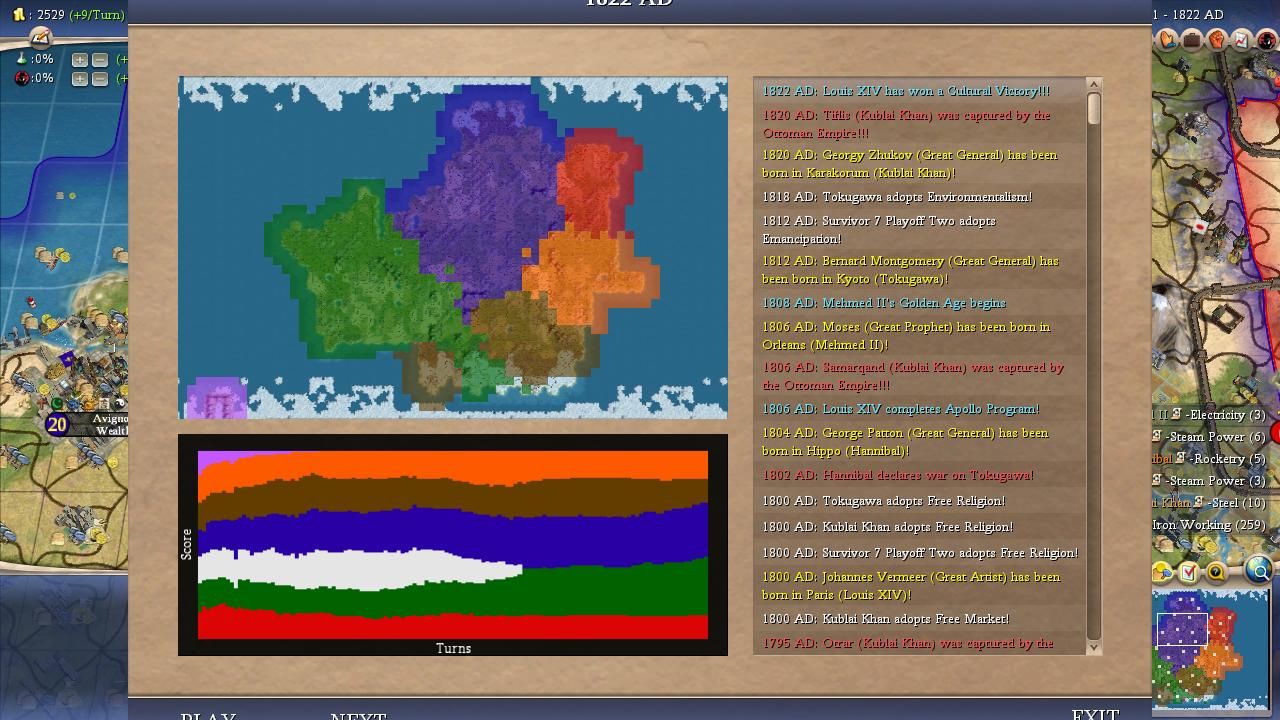
And for all Hannibal's lack of success this game, he still wasn't in the process of being conquered when it ended. Tokugawa was not so fortunate, although the fact that he survived to begin with was fairly impressive. Toku simply got dealt a bad hand here; after all he went through to get to the playoffs, he was rewarded with a cramped start next to the culturally dominant Louis. He didn't make any game-ending mistakes in the landgrab, but by the time it was over, he had no path to victory, especially given what was going on in the rest of the map. Some favorable situations leading to 2v1 wars are probably necessary for Toku to even come in second place on this map, and it was not to be here, but he at least tried to fight his way out of the trap, and his tenacious defense kept him sticking around through the end. Finally, Kublai Khan had a surprisingly weak game here. His landgrab looked good, but he faltered economically next to the two French leaders, then attacked De Gaulle too early and struggled to make headway against him. Louis's backstab, while not fatal, was the blow that ensured that Kublai wouldn't make anything of himself in this game; he couldn't seem to regroup after that, and just sat around for a long time instead before engaging in a late-game suicide attack. For a leader who claimed as much land as he did and only lost a single city before the suicide attack, Kublai was strangely impotent; perhaps the fast nature of this game prevented him from recovering as well as he otherwise might. At any rate, Kublai was at least successful in securing his Pool One status for another season, thanks to being the only top-seeded leader to win in the opening round.
This was somewhat of a strange game; a fast Cultural victory with little happening to disrupt the status quo was expected in the previous match's peaceful field, but in this group of warmongers it's much more of a surprising outcome. Especially after the bloodbath in the wildcard game, how many people were expecting there to be just one kill in this contest? But that's how it happened; the outcome of the game was pretty much set once the path was cleared for Mehmed to conquer De Gaulle, nobody strong was eager to go on the warpath again, and if anything there was less lategame drama this game than in the last! It's also worth noting that the spread of religions did indeed play a critical role in the game unfolding the way it did; without their secure shared border from their shared Christian faith, neither Mehmed nor Louis would have been able to coast to the top 2 the way they did, and I expect the alternate histories will see a lot of variance based not least around how religions spread differently from game to game.
Meanwhile, with a much more diverse pool of leaders coming in for the final playoff game, we ought to see a change of pace next week. Even if it does end up as another Cultural victory, I'd wager that there will be more twists and turns on the way there. Thanks as always for watching and reading!



